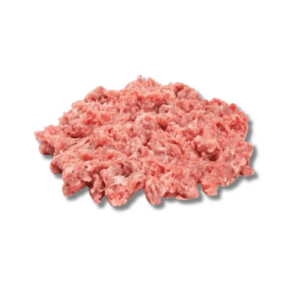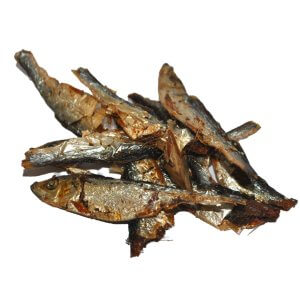The Benefits of Omega 3

Omega-3 is one of the single most potent supplements you can add to your dog’s diet. Countless studies have shown that omega-3 fatty acids have wide-ranging positive effects on the health of dogs. Amongst others, omega-3 fatty acids can contribute to the brain development of puppies, strengthen the immune system of dogs, reduce inflammation, increase the ability to fight cancer and benefit heart health.
What are Omega-3 Fatty Acids?
Fat plays an important role in the nutrition of dogs. However, not all fat is the same. While some fats solely act as a source of energy, other fats are closely associated with the health of our canine companions.
All nutritional fats are composed of fatty acids. The two primary groups of fatty acids are omega-3 and omega-6 fatty acids.
Omega-3 fatty acids include:
- Alpha-linolenic acid (ALA)
- Eicosapentaenoic acid (EPA)
- Docosahexaenoic acid (DHA)
Omega-6 fatty acids include:
- Linoleic acid (LA)
- Gamma linolenic acid (GLA)
- Dihomo-gamma-linolenic acid (DGLA)
- Arachidonic acid (AA)
While animals can produce some types of fatty acids out of other nutrients, certain types of fatty acids must be directly supplied via the food eaten. These fatty acids are referred to as essential fatty acids (EFAs).
Linoleic acid, an omega-6 fatty acid, is essential for all animals to stay in good health. Other fatty acids considered essential for dogs are the ALA and/or EPA and DHA. All of them are omega-3 fatty acids.
When it comes to health benefits in dogs, research has shown that EPA and DHA are most powerful. While the metabolism of dogs is able to convert limited amounts of the less powerful ALA to EPA and DHA, this process is not very efficient. Therefore, it is recommended to enrich the diet of your dog with omega-3 fatty acids high in bioavailable EPA and DHA.
Benefits of Omega-3 Fatty Acids for Dogs
Supporting the Brain Development of Puppies
Puppies fed food containing high amounts of omega-3 fatty acids rich in DHA performed better in various tasks than puppies with a low omega-3 diet. The tests the young dogs performed in this study included the visual differentiation of objects, memory, balance and coordination tasks.
Helping Dogs With Arthritis by Reducing Inflammation
Extensive research has shown that omega-3 fatty acids rich in EPA and DHA can form a crucial element in the treatment of canine arthritis. The dog owners involved in some of the studies confirmed that supplementing the diet of their pets with omega-3 fats resulted in significantly reduced discomfort, lameness and joint severity.
Improving the Ability of Dogs to Fight Cancer
Omega-3 fatty acids have shown that they are able to slow or even inhibit the development and metastasis of certain cancers. This effect has also been confirmed in a study involving 32 dogs with lymphoma. The supplementation of their diet with omega-3 fatty acids high in EPA and DHA, significantly increased their disease-free intervals and survival times.
Benefitting the Immune System of Dogs
Research has shown that the supplementation of omega-3 fatty acids (rich in EPA and DHA) to a canine’s diet positively effects their immune system. Effects described a range from alleviating the harmful effects of allergies caused by an over-reactive immune systems response, to substantially higher antibody titers after vaccinations.
Boosting the Heart Health of Dogs
Several studies involving dogs of different sexes, age, breed, size and weight, have shown considerable positive effects of omega-3 on canines suffering from different heart conditions. The positive effects include improved heart function and appetite, lower blood pressure, inflammation and reduced muscle loss. As a result, those dogs reported longer survival times in comparison to those dogs that did not receive omega-3 fatty acids.
Improving the Health of Dogs Suffering From Chronic Kidney Disease
Omega-3 fatty acids rich in EPA and DHA have significant positive effects on the health of dogs suffering from chronic kidney disease. The same study has also shown that feeding omega-6 rich vegetable oils (safflower) significantly worsens the condition of the dogs.
Contributing to the Skin and Coat Health of Dogs
The positive effect of omega-3 fatty acids on dogs suffering from the harmful effects of allergies, atopy, pruritus and flea allergies have also been extensively researched during the last several decades. These studies have shown that adding omega-3 fatty acids to a dog’s diet has an alleviating effect on their over-reactive immune systems. This leads to reduced itchiness and substantial improvements of their skin health and coat character.
Reducing Anxiety, Depression and Hyperactivity in Dogs
If your dog suffers from anxiety, depression or hyperactivity, he or she may benefit from supplementation with omega-3 fatty acids.
While the precise mechanism by which omega-3 fatty acid exerts effects on behaviour is not known, they have been proven to modulate neurotransmitters and to affect neuroplasticity. In fact, fatty acids have also been found to influence the same pathways that anti-anxiety medications do, most notably fluoxetine, a commonly prescribed treatment for anxiety disorders in dogs.
Healthy Sources of Omega-3 Fatty Acids High in EPA and DHA
- Small fatty ocean fish like anchovies or sardines. Both fish feed from krill and have relatively short life spans. They therefore do not harbor pollutants like larger, longer living carnivorous fish. You can feed these fish raw, frozen, dehydrated or canned (if packed in water, not oil).
- Fish oil made from anchovies or sardines (not from larger fish like herring, mackerel, salmon, etc.). The use of capsules is preferable over oils in bottles or pump dispensers, as the latter can easily get rancid.
- Krill oil is made of small, shrimp-like crustaceans living in large amounts in the oceans of the world. Krill is feeding from phytoplankton, which places them at the very bottom of the aquatic food chain. Again, capsules are preferable over bottles or pump dispensers.
- Phytoplankton as food supplement typically comes in form of a powder. It is derived from microscopic, single-celled plants that drift near the ocean’s surface. Phytoplankton can also be grown in aquacultures. Phytoplankton is the only recommendable plant-based (vegetarian or vegan) source of omega-3 fatty acids rich in EPA and DHA.
-
Dog Food
Pin Oaks Minced Chicken Necks 500g
R52.00 Select options This product has multiple variants. The options may be chosen on the product pageRated 0 out of 5 -
Craving Nature
Craving Nature Pork Ears 2 Pack
R55.00 Select options This product has multiple variants. The options may be chosen on the product pageRated 0 out of 5 -
Healthy Pet Accessories
Healthy Pet Accessories – Bio-Degradeable Poop Bags – 20 Per Roll
R20.00 Add to cartRated 0 out of 5





